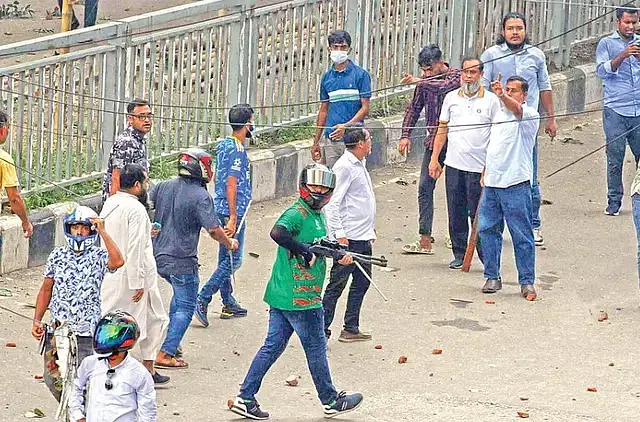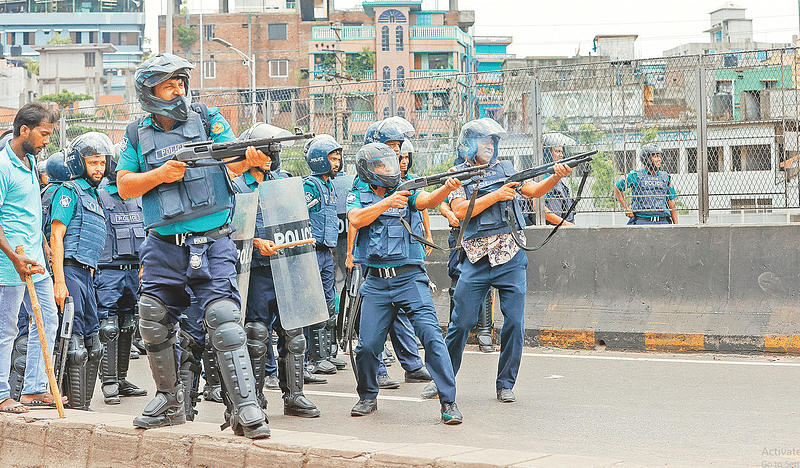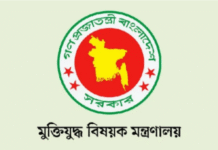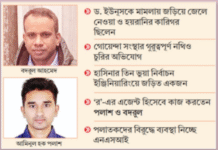
Police had filed at least 35 cases in Dhaka city over the July killing during Awami League’s term. Those trumped-up cases implicated BNP and Jamaat men. However, investigation by police now revealed that BNP and Jamaat men were not involved in those killings of protesters in July last year.
Police, however, could not find out who was involved with killing 62 persons in those 35 cases. Police recently submitted final reports on these 35 cases filed during the Anti-discrimination Student Movement in Dhaka. Lawyers and court sources believe the then ruling Awami League used police to implicate BNP and Jamaat to cover up the involvement of its own activists. It is therefore acceptable that BNP and Jamaat men have now been acquitted but failure to unearth who were responsible for the killings is not acceptable.
A case’s trial is based on the probe report or charge sheet submitted by the police. Submitting a final report instead of a chargesheet means that the investigation of the case remains suspended if the court again orders a probe. Legal experts say it is the duty of police to identify who is involved with a crime. But submitting final reports without finding out who is involved with the crimes will raise questions.
In the final reports of nine out of 35 cases, police stated that the leaders and activists of Awami League and its associate organisations were seemingly involved with these killings. But the investigation officers failed to unearth who those leaders and activists were.
Asked, Dhaka Metropolitan Police’s joint commissioner (crime) Md Faruque Hossain told Prothom Alo on Thursday that those final reports were submitted as per law after carrying out investigation. The court has accepted these.
A special cell on the July-August mass uprising on 1 January published a draft list of 858 people killed during the movement. Police had filed many cases over some of the incidents before 5 August in Dhaka, which blamed BNP and Jamaat men for the killings, apparently to cover up their own involvement. Also, the relatives of the victims at that time said the killings took place by firing either from police or Awami League leaders and activists.
Prothom Alo on 1 August published a report analysing documents of 34 cases filed with different police stations in Dhaka. The report titled “People killed in firing by criminals, claim police in case statements” found that the statements of these cases are almost identical. The case statements read that leaders of BNP and Jamaat, at the behest of their top leadership, or the miscreants attacked police with firearms, explosives or lethal weapons. The incidents of killing took place by these criminals who were masquerading as quota protesters.
The AL government was toppled in the student-led mass uprising on 5 August and an interim government was formed on 8 August. Subsequently, the relatives of the victims filed cases. The trial of killings during the July-August movement is also taking place in the International Crimes Tribunal. Meanwhile, the police submitted final reports in 35 cases in October, November and December.
Dhaka district and sessions judge court’s chief public prosecutor Omar Faruque Faruqui told Prothom Alo that he is aware of submission of final reports in several cases. These cases were filed by police at that time mainly to save leaders and activists of Awami League and its associate organisations, implicating the BNP and Jamaat men.
He maintained that the cases were mainly faulty. Police submitted final reports in those cases as many of the families of the victims filed fresh cases after the fall of Awami League government.
However, the analysis of the final report shows that in at least 6 cases, the police have said that in the future, the cases will be revived if the names, addresses and evidence of the people involved in the murders are found.
These are the murder case of Rakib Hossain, 23, Maruf Hossain, 20, and Sohag, 19, filed at Rampura police station; the murder case of Arif, 18, Rabiul Islam, 27, and four others from Jatrabari police station; the murder case of Rakib, 22, from Uttara Paschim police station; the murder case of Gani Sheikh, 45, Hannan, 22, and Monir Hossain, 28, from Bhatara police station; the murder case of Hasan, 18, from Badda police station and the murder case of Masud, 40, from Kadamtali police station. In four cases, the police have said that there is another case in the same incident.
Criminal law experts maintain that submitting final reports without detailed investigation is not acceptable.
Supreme Court lawyer ZI Khan Panna told Prothom Alo on Wednesday that proper investigation is the key in murder cases. If investigation is not carried out properly, the chance to deliver justice gets slimmer.
Who are these miscreants
Final reports of at least four cases state that killings took place due to ‘indiscriminate firing by law enforcers or miscreants’ or ‘firing by law enforcers and unknown miscreants’. The four cases were filed with Jatrabari police station. These are: Imam Hasan murder case, Jakir Hossain and Imon murder case, Sohag murder case and Sakib murder case.

Final reports of at least four more cases mention that killings took place due to firings by miscreants in association with police. One such case was filed with Jatrabari police station over the killings of Jihad Hossain, 22, and Ibrahim, 13. The police in its final report state, “Unknown miscreants wearing helmets and masks shot at the peaceful protests of students and mass people, leading to deaths of Jihad and Ibrahim.” Similar reasons were attributed to the Ruhan murder case and Jafor Hawlader murder case with Jatrabari police station and Abdul Ahad murder case with Kadamtali police station.
However, the investigators could not identify who were those miscreants who sided with police to attack protesters.
Which police station files how many report
Of the 35 cases, 12 were filed with Jatrabari police station. These cases involved murder of 28 people. Police submitted the final reports in these cases on 28 and 29 October. Kadamtali and Badda police stations have submitted final reports of four cases each, Lalbagh and Mohammadpur three each, Mirpur and Rampura two each and Sutrapur, Banani, Bhatara, Kafrul, New Market and Uttara Paschim police stations have submitted reports in one case each.
On 17 July, a person named Imran was shot to death in Jatrabari during the Anti-discrimination Student Movement. On 27 July, police filed a murder case with Jatrabari police station against unknown persons in this regard. After a three-month investigation, the police could not identify anyone involved in Imran’s murder. Jatrabari police station submitted a final report to the court in the case on 28 October. The final report states that the plaintiff had blamed BNP and Jamaat leaders and activists in the case. But no evidence was found corroborating the claim. Imran was shot dead by miscreants. The final report was submitted without adjourning the case due to lack of evidence.
Dhaka Chief Metropolitan Magistrate (CMM) court on 4 November accepted the final report submitted by the police. Asked about the case, the investigation officer of Jatrabari police station, sub-inspector (SI) Rafiqul Islam Bhuiyan, told Prothom Alo that despite many attempts, he could not identify the people involved in Imran’s murder.
This correspondent spoke to the investigation officers of 12 murder cases. They made almost identical comments that BNP and Jamaat leaders and activists were accused in these cases based on false information. Their investigation found no evidence of involvement of anyone from BNP or Jamaat. Also it was not possible to identify who shot the victims.
A student named Hasan, 18, was shot dead while protesting in front of Canadian University in Badda. Sub inspector Harun-or-Rashid, investigation officer of the case filed over his murder, told Prothom Alo on 28 December that the case would be revived in future if information can be gathered over the incident.
The analysis of the final report shows that in some cases, the police have said that evidence related to the case was destroyed due to the burning of the police station. For example, the final reports from Jatrabari and Bhatara police stations have said that documents and evidence were destroyed in the fire at the police station.
However, some of the families of the victims allege that the police did not even investigate properly. Seven people including one named Wasim were killed in Jatrabari on 18 July. Tamanna Khatun, the sister of Wasim, told Prothom Alo that she does not know whether the police filed a separate case over the murder of her brother. Her brother was shot in the head. The bullet was stuck inside his head. The police have not yet seized her brother’s blood-stained clothes.
Amin Gani, a criminal lawyer, told Prothom Alo that it is very important to seize evidence in any murder case as having evidence is a must for trial of a murder case.
‘Awami League involved’, but no names mentioned
The police in final reports of at least nine cases state that the investigation indicates involvement of leaders and activists of Awami League and associate organisations. However, they could not identify anyone involved with the killings.
Rakib Hasan, 10, was shot dead near Mohammadpur Town Hall Market in the evening of 19 July. Police submitted the final report of the case on 6 November. The report mentioned that Hasan was shot in the head during an attack by Awami League, Jubo League and Chhatra League (now banned) men.
Sohidul Osman, investigation officer of the case, told Prothom Alo that he could not identify any specific person involved with Hasan murder.
‘Important to identify who killed these people’
No matter what is in the FIR of a criminal case or who the plaintiff is, it is the responsibility of police to find out the accused through a proper investigation, collect evidence and witness and conduct forensic tests.
Justice Abdul Matin, retired judge of Appellate Division, told Prothom Alo on Thursday that it is important to identify who killed these people. And it is the police’s responsibility to find out.
The court can order reinvestigation of these cases if necessary, Abdul Matin adds.
prothom alo









